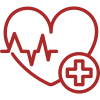Dr Warrick Bishop elucidates the key to a healthy heart as founder of The Healthy Heart Network after his experience with a patient and runner led to cardiac arrest and with statistics to lose sleep over, this is one show not to miss.
The world's first human heart transplant was performed at Groote Schuur Hospital, Cape Town, South Africa, by surgeon Christiaan Barnard, on 3 December 1967. The 'new' heart functioned normally until the recipient's death from double pneumonia 18 days after the historic operation.
“I ended up as a cardiologist by chance."
As a young fellow at high school, I was good at mathematics and technical drawing together with physics and chemistry and thought my career would be in engineering. As fate would have it, I had the opportunity to do work experience in a local civil engineering company at that time. Not understanding what civil engineering was, over two weeks I observed mainly office based work focusing on retaining walls and draining systems. Unfortunately, I don’t think that is was a fair representation of the breadth and interest that engineering could offer, but I didn’t know that and I was no longer enthusiastic about engineering from the experience.
COVID-19 and heart disease are not happy bedfellows but they can become companionable.
As the pandemic rolls on, it is apparent that older people and those with comorbidities are more at risk than others. Those comorbidities include conditions related to long-term elevated cholesterol levels, such as previous heart attack or previous stroke. These raise concerns around how best to approach living in a virus-infected world.
The two words, 'heart failure', send a spark of fear through the healthiest of people. What most people hear are the words 'heart attack' and, even in today's world of medical marvels, they spell F-E-A-R. Yet, those are two very different conditions.
Severe crushing chest pain hits you. OMG - a heart attack! Or is it?
Heart failure, or cardiac failure, is a weighty condition in today's society, affecting approximately 480,000 people in Australia and more than 25 million world-wide. The Cinderella of cardiovascular disease; it is much less known than heart attack or stroke, yet heart failure (HF) is a serious condition with a worse outcome than most cancers. And it affects more women than men.
Are you on a cholesterol lowering tablet? Are you happy you're on a cholesterol lowering tablet. Do you know exactly why you're on that tablet? Do you know what goal or objective, what levels you're aiming for with that tablet?
I'm interested in trying to reduce cardiovascular events, or heart attack, for individuals. I've got a question for you today, though.
What I'd like to know is whether you're engaged in looking after your own health and do you know what your up-to-date sugar levels are?
An ageing population and our western lifestyle are ensuring that the prevalence of a common medical condition, atrial fibrillation (AF), is increasing at such a rate that it is predicted to be the next cardiac epidemic.

















